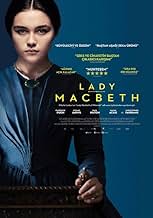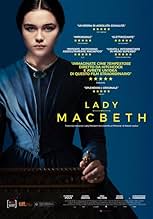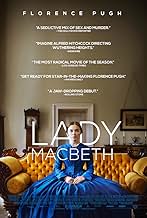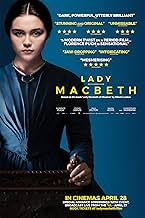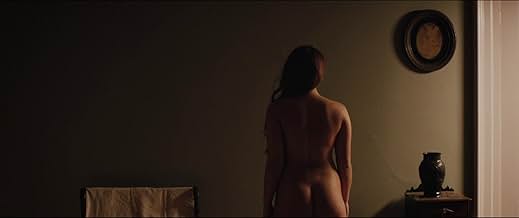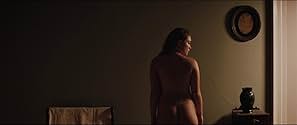In 19th-century rural England, a young bride who has been sold into marriage discovers an unstoppable desire within herself as she enters into an affair with a worker on her estate.In 19th-century rural England, a young bride who has been sold into marriage discovers an unstoppable desire within herself as she enters into an affair with a worker on her estate.In 19th-century rural England, a young bride who has been sold into marriage discovers an unstoppable desire within herself as she enters into an affair with a worker on her estate.
- Nominated for 2 BAFTA Awards
- 24 wins & 58 nominations total
Kema Sikazwe
- Farmhand
- (as Kema Slkazwe)
- Director
- Writers
- All cast & crew
- Production, box office & more at IMDbPro
Featured reviews
This film tells the story of a young woman who is sold into a loveless marriage with an older wealthy gentleman. She has a passionate affair with a servant of the house. The promise of a happier life eludes her, until she takes full control of the situation.
Initially I thought the film was really about Macbeth's wife, but I soon learn that it is not the case. The title comes from the similar ruthlessness and cold bloodedness that the leading woman and Lady Macbeth have. It is engaging to see how Katherine transforms from a timid woman into a sociopathic woman who will stop at nothing to get what she wants. The pacing is a little slow, with artistic shots lasting 10 or even 20 seconds but does not really help story telling. Overall, the story is good and Katherine's character is very interesting.
Initially I thought the film was really about Macbeth's wife, but I soon learn that it is not the case. The title comes from the similar ruthlessness and cold bloodedness that the leading woman and Lady Macbeth have. It is engaging to see how Katherine transforms from a timid woman into a sociopathic woman who will stop at nothing to get what she wants. The pacing is a little slow, with artistic shots lasting 10 or even 20 seconds but does not really help story telling. Overall, the story is good and Katherine's character is very interesting.
I'm not familiar with the Lady Macbeth of Mtsensk short story by Nikolai Neskov (not to be confused with Lady Macbeth by William Shakespeare) which he wrote as a novella in 1865, although it is inspired by the famous play.
the book inspired Shostakovich to write an opera based on it.
Now we have a British film that feels incredibly French (incredibly Michael Haneke, who I think is actually Austrian) to add to its cannon.
It features a career defining performance by Florence Pugh in the title role; although the men are magnificent too (most notably Christopher Fairbanks as the intolerant Father in Law).
If you like Christopher Fairbanks through his Guardians of the Galaxy fame this is not the movie for you as it moves at glacial pace with very little dialogue, virtually no music and a LOT of fixed frames where you are invited to enjoy the cinematography in its most bleak and spartan Northernness.
"It's grim up north" might have been the poster slogan for this movie because, set as it is near the North East of England's colliery land, albeit on the moors (North Yorkshire I'd suggest), it is most certainly grim.
The story is murderously grim too and I'd expect this BBC Films production to be in the running when next year's BAFTA's are handed out with Florence Pugh a shoe in for best female actor.
Slow but sublime with excellent direction from William Oldroyd.
the book inspired Shostakovich to write an opera based on it.
Now we have a British film that feels incredibly French (incredibly Michael Haneke, who I think is actually Austrian) to add to its cannon.
It features a career defining performance by Florence Pugh in the title role; although the men are magnificent too (most notably Christopher Fairbanks as the intolerant Father in Law).
If you like Christopher Fairbanks through his Guardians of the Galaxy fame this is not the movie for you as it moves at glacial pace with very little dialogue, virtually no music and a LOT of fixed frames where you are invited to enjoy the cinematography in its most bleak and spartan Northernness.
"It's grim up north" might have been the poster slogan for this movie because, set as it is near the North East of England's colliery land, albeit on the moors (North Yorkshire I'd suggest), it is most certainly grim.
The story is murderously grim too and I'd expect this BBC Films production to be in the running when next year's BAFTA's are handed out with Florence Pugh a shoe in for best female actor.
Slow but sublime with excellent direction from William Oldroyd.
The story starts with a marriage. When the wedding is over, we all expect a romance to accure. Though all we observe is a loveless husband who's going to enslave his woman as a figure in a cage. The powerless lady who had tried to be a devoted compliant wife by obedience, receives no reward in return. Untill this part you've already made your side. You excessively sympathize with the oppressed lady.
But soon after, everything changes. In the absence of her husband, she finds her power and freedom to rule the house. The woman who's been inadequatly satisfied in love and passion, makes an affair with one of his stable workers. The taste of freedom to rule makes her insane to do anything to maintain the condition, even if it means she has to murder someone, has to enslave others or has to sacrifice her love.
The movie indicates how feasible it is for an innocent hunt to be the predator hunter, if they find the moment. The performances of Florence Pugh, Naomi Ackie and Cosmo Jarvis are mesmerizing. Although the script, to put it bluntly, is not perfect, I liked it. All in all, it absolutely worth watching and I recommend you to do so.
But soon after, everything changes. In the absence of her husband, she finds her power and freedom to rule the house. The woman who's been inadequatly satisfied in love and passion, makes an affair with one of his stable workers. The taste of freedom to rule makes her insane to do anything to maintain the condition, even if it means she has to murder someone, has to enslave others or has to sacrifice her love.
The movie indicates how feasible it is for an innocent hunt to be the predator hunter, if they find the moment. The performances of Florence Pugh, Naomi Ackie and Cosmo Jarvis are mesmerizing. Although the script, to put it bluntly, is not perfect, I liked it. All in all, it absolutely worth watching and I recommend you to do so.
Looking at the title, you might think director William Oldroyd's Lady Macbeth is about revenge, lust, murder, and boredom, and you would be right on all counts. Katherine (Florence Pugh), a 19th century teen bride of an arranged marriage to a middle-aged drunk, can't get no satisfaction. Her husband is impotent for starters, and the estate is so forbidding murder would seem to be a required pastime.
Yet, sex is the prime mover here, where she discovers randy groomsman Sebastian (Cosmo Jarvis), and takes him to bed in the long absence of her hubby. Meek black Anna (Naomi Ackie), Katherine's servant, observes the shenanigans, much as we do, unable to change what she sees will be an outcome unpleasant to the core. To the end Anna is faithful to Katherine, a slave to a mistress who is herself a slave to men and convention.
Several archetypal themes arise in this somber, artfully-photographed drama. For instance, one that emphasizes the wages of sin is prominent; another about the subjugated rising against the oppressor; and another about the danger of socially imprisoning smart women in a paternalistic society. A leitmotif also surfaces about the dangers of debilitating class distinctions, which are never a good thing in the long haul.
Ari Wegner's cinematography is portrait-like if considering only the recurring shot of Katherine sitting on her Victorian couch in a consuming dress that seems to deteriorate with each similar shot. Underneath the dress is the corset, so long a symbol of the era's tight hold on women.
Remembering Amma Asante's Belle, I'm pleased to see another art- film treatment of fraught race relations in merry ol' England. That none of this will ever stop is promised in the spawn of the miscreants, children of evil destined to repeat their parents' sins.
Lady Macbeth is an interesting minimalist story of a smothered young woman, whose intensity will lay waste to the social fabric of the estate. In fact, much of the proceedings are Shakespearean with their emphasis on man's weakness in his dominance, a woman's Eve-like ability to lure men into sin, and the pride that inevitably leads to a fall.
Depressing but dramatically satisfying.
Yet, sex is the prime mover here, where she discovers randy groomsman Sebastian (Cosmo Jarvis), and takes him to bed in the long absence of her hubby. Meek black Anna (Naomi Ackie), Katherine's servant, observes the shenanigans, much as we do, unable to change what she sees will be an outcome unpleasant to the core. To the end Anna is faithful to Katherine, a slave to a mistress who is herself a slave to men and convention.
Several archetypal themes arise in this somber, artfully-photographed drama. For instance, one that emphasizes the wages of sin is prominent; another about the subjugated rising against the oppressor; and another about the danger of socially imprisoning smart women in a paternalistic society. A leitmotif also surfaces about the dangers of debilitating class distinctions, which are never a good thing in the long haul.
Ari Wegner's cinematography is portrait-like if considering only the recurring shot of Katherine sitting on her Victorian couch in a consuming dress that seems to deteriorate with each similar shot. Underneath the dress is the corset, so long a symbol of the era's tight hold on women.
Remembering Amma Asante's Belle, I'm pleased to see another art- film treatment of fraught race relations in merry ol' England. That none of this will ever stop is promised in the spawn of the miscreants, children of evil destined to repeat their parents' sins.
Lady Macbeth is an interesting minimalist story of a smothered young woman, whose intensity will lay waste to the social fabric of the estate. In fact, much of the proceedings are Shakespearean with their emphasis on man's weakness in his dominance, a woman's Eve-like ability to lure men into sin, and the pride that inevitably leads to a fall.
Depressing but dramatically satisfying.
Frances Pugh is the gravitational force of this film; not simply filling the role, but her presence consuming the other characters, the building to which she is confined for most of the film and the shots she inhabits even when silent. In that respect, it's a performance that reminds me of Glenn Close's brilliant turn as the central character in The Wife, a role and film that have more similarities to this than one might first think. That's not to say her performance is greedy - far from it, it has a remarkably understated power; and the rest of the cast act without ego, with great subtlety to all how her to shine in the way in which her role demands. The purpose of the title is only occasionally and vaguely apparent for much of the film, but comes into horrible and brilliant focus in the final act; it's a title the central character earns. But it's the silences that haunt the most and lend this film its creeping power - the background silence of a stately home in the middle of rural northern England; the silence of the house itself; the silence of key characters; and most of all Florence Pugh's silence as she fills the screen, motionless and noiseless in a series of near but not quite identical shots that punctuate the film like refrains, lending a quiet kind of awe to the devastating ending.
Did you know
- TriviaFlorence Pugh said she loved her nude scenes in this film. Pugh reflected on her breakout role during an interview for Britain's ES Magazine and admitted the part "changed everything" for her. "I loved the fact she was naked all the time. At that point in my life, I had been made to feel shit about what I looked like and that film was perfect. There was no room for me to feel insecure."
- GoofsA Cornish Rex cat first appears at 14:30. The breed first appeared around 1950.
- ConnectionsFeatured in The EE British Academy Film Awards (2018)
- SoundtracksPraise to the Lord, the Almighty
(uncredited)
German folk tune
Lyrics by Joachim Neander, translated by Catherine Winkworth
- How long is Lady Macbeth?Powered by Alexa
Details
- Release date
- Countries of origin
- Official sites
- Language
- Also known as
- Lady Macbeth
- Filming locations
- Lambton Castle, Chester-le-Street, County Durham, England, UK(The Lesters' home)
- Production companies
- See more company credits at IMDbPro
Box office
- Budget
- £500,000 (estimated)
- Gross US & Canada
- $1,129,408
- Opening weekend US & Canada
- $64,537
- Jul 16, 2017
- Gross worldwide
- $5,343,632
- Runtime1 hour 29 minutes
- Color
- Aspect ratio
- 2.39 : 1
Contribute to this page
Suggest an edit or add missing content






